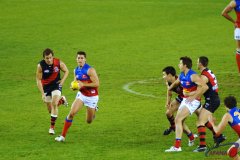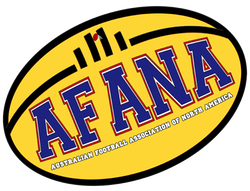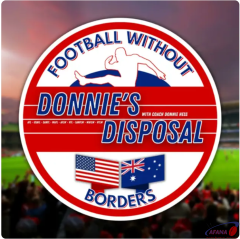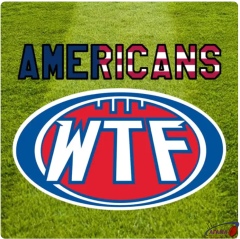
The AFL began announcing its annual Hall of Fame inductions at the beginning of June. Due to the pandemic, the usual gala ceremony could not be held. The announcements were made gradually over a period of days and everything had to be done remotely. Brisbane premiership teammates Jonathan Brown and Simon Black were inducted, joining fellow teammates Michael Voss (2011), Jason Akermanis (2015), and Nigel Lappin (2016). Their admissions reinforce Brisbane's status as one of the most dominant teams of the early 2000s. Beloved St Kilda stalwart Lenny Hayes was another inductee. Also inducted were two greats of the Port Adelaide Magpies in the SANFL: John Albey and Greg Phillips; as well as former Eagle ruckman Dean Cox and beloved commentator Dennis Cometti. Coaching great John Kennedy Sr was elevated to legend status. Kennedy was one of the inaugural inductees as a coach in 1996. AFL boss Gil McLachlan visited Kennedy and his wife at their home to inform Kennedy of his elevation.
Both Brown and Black attribute the Lions' success to then-coach Leigh Matthews (who played under Kennedy). The team had lost five of their first nine games in 2001 and, according to Brown, it was a message from Matthews which led to their incredible run of success, "The main reason I'm in is because of the success of that team. We were fortunate to have Leigh. He just made everything as simple as he could ... There was a lot of simplicity when he spoke ... We just bought in, totally ...".
Black concurred, "I go back to Leigh's words when we were struggling ... 'If we have team success, our individual reputations will be so much greater ... The one that personifies that statement is when Shaun Hart ... wins the Norm Smith Medal (in 2001) ...'. Black added that it wouldn't have been possible without the team-first mentality, "Sometimes, the toughest thing to do is actually give yourself a chance at success, and we were ... able to do that because everyone did their bit for the team."
Brown's debut match in 2000 belied what he would later become - an imposing forward. In that first match, he failed to gain possession, take a mark (catch the ball) or kick a goal. He emerged in 2001 to become the focal point of the Lions' attack serviced by "the Fab Four" midfield of Black, Voss, Akermanis, and Lappin.
Black, at just 22 years of age, won Brisbane's best and fairest award as well as a premiership medal. He is considered the equal or better of any midfielder of his generation. A testament to that are the 2002 Brownlow Medal and the 2003 Norm Smith Medal (Grand Final best on the ground).
Hayes was born and raised in suburban Sydney and was one of just two at his school who played Aussie Rules. At the time, the area was primarily rugby territory. Drafted in 1999, Hayes became a stalwart of the club and a fan favorite. He himself, in an interview afterward, admitted he wasn't the most talented player going around, “... I wasn’t overly quick, I never took a hanger (high catch of the ball or screamer) ... I couldn’t kick the ball over a jam tin ... so the contested side of it was what suited me ... that’s the great part of the game is that there’s something for everyone ... I also wanted to be a player that when I did get it, especially being a midfielder ... wanted to be able to connect with the forwards. I think there was always that balance ... being at the coalface was probably where I felt most comfortable.” Of his induction, Hayes said it was a bit of shock when he got the call but then felt that it was a tremendous honor once it all sank in. He said he is proud and thankful for the career he had.
Former teammate, Nick Riewoldt said Hayes was one of the best he had played with, “Even when canvassing teammates, past coaches, medical staff before ...speaking today ... I’m very privileged ... because everyone would love to be ... talking about Lenny. There are so many moments ... when we were better players and better people for having Lenny as a friend or teammate. He’s the best player, teammate, warrior - all of those things, he’s at the top of the box in every one."
Riewoldt continued saying he had one of the best seats in the house watching Hayes, “There was just something innate within him that just drove his desire to compete so strongly and I can’t think of a moment where there was a short step, there was anything less than everything he had to give. There were times when ... you would almost wince at some of the collisions, some of the positions that he put himself in.”
Riewoldt described Hayes as the “complete midfield package” and said, “If you’re a lover of the competitive, tough style of game, he’s your man. If you’re a lover of the silk and the finesse and the high skill level, there’s something in Lenny’s game for you. If you love guys that just compete, he’s your man. There’s something for everyone encapsulated within Lenny Hayes as a person."
Hayes is also known for his courage and good nature. The first can be noted by his career tackle count of almost 1500 (a league record when he retired). The second by him being voted the "best bloke" in the AFL in a 2012 media poll.
Hayes was later interviewed on SEN and reflected on the disappointment of St Kilda's Grand Final losses and failed finals campaigns. During his time, the Saints lost the 2009 Grand Final and the 2010 Grand Final replay. The team also lost preliminary finals in 2004, 2005, and 2008, “Not achieving the ultimate ... I think any player would swap any individual accolades to achieve that ultimate success as a team ... For us, it just didn’t fall our way ... I do admire the teams who can go on and win two or three in a row because I know how bloody hard they are to win ... I would have loved nothing more than to enjoy that (win a premiership) with my mates and also the supporters. It just wasn’t meant to be. “Do I dwell on it? Every now and again ... watching Grand Finals now you can envisage it would have been so good to feel that … but it wasn’t meant to be.”
He was a towering figure, both physically and as an icon, and It is his coaching career for which Kennedy is most renowned. Kennedy, now 91, debuted for the Hawks in 1950 and played 18 games that year. Unfortunately for him and the Hawks, all were losses. He went on to play 164 games for the Hawks, retiring at the end of 1959. The Hawks appeared in just two finals during his playing career in 1957. He did, however, win four club best and fairest awards. He was a stand-in coach for one game in 1959 and took over as senior coach following his retirement. He immediately set about to turn the team into a powerhouse. A school principal by trade, Kennedy was a strict disciplinarian who emphasized fitness. He put the players through grueling training camps to harden them up and the Hawks, previously considered easy-beats, became known as "Kennedy's Commandos". They went on to win their first premiership in 1961 but lost in 1963 to Geelong. Kennedy stepped down afterward but returned in 1967 and took the club to two more premiership victories. Kennedy left Hawthorn after their 1976 Grand Final win over North Melbourne but had left an indelible mark on the club and two players who would later go on to have successful coaching careers - David Parkin and Leigh Matthews. He was also an influence on Allan Jeans, Allan Joyce, and Alastair Clarkson. He coached North Melbourne 1985 to 1989 before joining the AFL Commission which he chaired 1993 to 1997. Kennedy captained and coached Victoria. The AFL's lifetime achievement award is named in his honor and he was in 2003 named Hawthorn's first-ever club Legend in their hall of fame.
John Jr (241 games 1979-1991) also played in four premierships for the Hawks. Grandson Josh played 13 games for the Hawks before crossing to Sydney in 2010. Kennedy Sr is proud of Josh but told the AFL website in 2012, ahead of Hawthorn's Grand Final match against the Swans, that he would be happy if the Hawks won. When they lost to Sydney, Kennedy preferred to console the Hawthorn players rather than join grandson Josh in his victory celebrations.
JONATHAN BROWN
Games: 256 2000-2014
Goals: 594
Premierships: 2001-2003
Club captain 2007-08 (joint), 2009-2013
Club Best & Fairest: 2007-2009
Club Leading Goal Kicker: 2007, 2009, 2010, 2012, 2013
Coleman Medal: 2007
All Australian: 2007 (Vice-Captain), 2009
Represented Victoria in the Hall of Fame Tribute Match: 2008 (Captain)
Robert Rose Award for Most Courageous Player: 2007, 2008, 2011
AFLPA Best Captain Award: 2007, 2009
AFL Mark of the Year: 2002
Preseason Premiership: 2013
Victoria Representative: 2008
Victoria Captain: 2008
Brisbane Lions Best Clubman: 2005
Marcus Ashcroft Most Professional Player: 2009
Brisbane Lions Most Improved Player: 2001
Brisbane Lions Best Forward: 2007, 2008
Shaun Hart Most Courageous Player: 2007, 2010
Brisbane Lions Members' Player of the Year: 2010
The Courier-Mail Player of the Year: 2007
SIMON BLACK
Games: 322 1998-2013
Goals: 171
Premierships: 2001-2003
Club Captain: 2007-08 (joint)
Brownlow Medal: 2002
Club Best & Fairest: 2001 (equal), 2002, 2006
Norm Smith Medal: 2003
All-Australian: 2001, 2002, 2004
AFL Rising Star Nominee: 1999
LENNY HAYES
Games: 297, 1999-2014
Goals: 95
Club Best & Fairest: 2003, 2010, 2012,
All-Australian: 2003, 2005, 2009
International Rules:2003
Club Captain: 2004, 2007
Norm Smith Medal: 2010 (tied Grand Final)
All-Australian: 2003, 2005, 2009, 2010
AFL Rising Star Nominee: 1999
Madden Medal: 2014 (for community service)
Preseason Premiership: 2004, 2008
GREG PHILLIPS
Port Adelaide Games: 343, 1976-1982 , 1987-1993
Collingwood Games: 82, 1983-1986
Goals 93 with Port, 12 with Collingwood
SANFL Premierships: 1977, 1979, 1980, 1981, 1988, 1989, 1990, 1992 (captain)
SA representative 1978-1990, 20 games
Port Adelaide Best and Fairest 1988
Port Adelaide Captain 1991-1993
All Australian 1980
Fos Williams Medal 1982 best on ground for SA)
Port Adelaide's greatest team (center halfback)
Port Adelaide life member
SANFL life member
South Australian Football Hall of Fame Inaugural inductee (2002)
Former coach John Cahill (also inaugural coach of Port when they entered the AFL) said of Phillips, "... I cannot remember a time I had to change him because he was getting beaten, he was so good ... He was so strong, courageous, had the safest hands ... as soon as he got near the ball, the halfback flankers and the back pockets would just take off. He was so talented.”
Greg Phillips, 61, not only impact on the field but has had a bit off it as well. His daughter Erin is a star for the Adelaide Crows in the AFLW. She would have preferred to join Port, but they do not have an AFL license. Another daughter Amy is married to Hawk star Shaun Burgoyne.
JOHN ABLEY
GAMES: 212 games, 1950-1961
Goals: 1
Premierships 1951, 1954, 1955, 1956, 1957, 1958 and 1959
Honors: Represented SA 23 times; All-Australian full back, 1956, 1958 and 1961; Port Adelaide and South Australian Football Hall of Fame, Port Adelaide’s ‘Greatest Team’ (1870 – 2000, fullback)
Cahill, who played alongside Abley said he was a nightmare for forwards "He took it as an offense against him if a player got a kick, let alone a goal, and he marshaled that Port Adelaide defense. With his speed, he was always able to get a fist on the ball, and he never lost his feet ...".
DENNIS COMETTI (MEDIA)
Played 38 games and scored 70 goals for West Perth: 1967-1971
Coached 65 games for West Perth: 1982-1984
Football broadcast history:
1972 - 1985: ABC Radio
1986 - 2001: Seven Network
2002 - 2006: Nine Network
2007 - 2016: Seven Network
2008 – 2011: 3AW
2012 – Present: Triple M
Appointed as a member of the Order of Australia (AM): 2019
Alf Potter Award: 2006
AFMA Television Caller of the Year on 11 Occasions
Sport Australia Lifetime Achievement Award: 2018
Sport Australia Hall of Fame: 2019
Inducted into the MCG Hall of Fame
Inducted into the AFMA Hall of Fame
Upon hearing the news of his induction, Cometti said he didn't think he was eligible and was overwhelmed by the honor. Although retired from the mainstream weekly AFL broadcasts, he still calls Perth games for Triple M radio alongside his son Mark. Cometti himself was a handy footballer for West Perth in the WAFL under the coaching of the legendary Polly Farmer. He started in 1967 as a teenager, kicked 68 goals in 1968, and played one more season. He quit in 1969 after his father passed away and headed to Melbourne where he played some reserves games for Footscray (now Western Bulldogs) in the VFL. However, he worked nights which interfered with training. He returned to West Australia in 1971 for a few more games with West Perth. He even had a stint as a coach but his real passion was broadcasting. One of his early jobs was as a DJ and had a fondness for two up-and-coming bands in the Beatles and Rolling Stones. He was mainly a cricket commentator but fate intervened when he was working alone at a WA radio station and a call came in. It was from someone who needed a partner to call a footy match. Dennis jumped at the chance and the rest, as they say, is history. His career would span 35 years. His smooth voice and often off the cuff witticisms reaped millions of fans and numerous accolades. His iconic "centimeter perfect" comment is perhaps his best known. He started with "inch-perfect" but had to change it when Australia went metric. In 2004, Centimetre Perfect was published to immortalize some of his wittiest comments. A few of those:
“Remarkable goal by James Hird. Just moments ago, he was flattened and on the Dis-Orient Express”
"A couple of big touches from Clive Waterhouse, who was battling ... and in real danger of becoming Clive Waterboy"
“Not only have the wheels come off for the Swans, but the axles, the muffler and they've lost the ashtray”
“That's the epitome of a balanced backline. Peter Dean plows them under and Michael Sexton notifies the next of kin”
“Andrew Dunkley's kick went so high it ricocheted off the Hubble Telescope”
“Brett Johnson has become a leather magnet. And before you say there's no such thing, spare a thought for my wife and my wallet”
DEAN COX
Games: 290, 2001-2014
Goals: 169
Premiership: 2006
Club Best & Fairest: 2008
All Australian: 2005, 2006, 2007, 2008, 2011, 2012
Represented the Dream Team in the Hall of Fame Tribute Match in 2008
East Perth Premiership Player: 2000
Simpson Medal: (2000 "best on ground" in WAFL Grand Final)
Cox hails from a very small town approximately 970 miles north of Perth. He started with the local team before heading to Perth at the age of 18 to join the WAFL. He did not think he was good enough for the AFL. He joined East Perth and was later invited by a West Coast recruiter to train for a spot on the Eagles' rookie list. He made it to the list but was fifth in line in the ruck department. His best on ground performance in the WAFL Grand Final earned him a promotion to the senior list the following season.
He developed a strong work ethic, studied opposition ruckmen, and trained on his days off to gain a competitive edge. The physicality of his contemporaries such as Matthew Allan, Luke Darcy, Steven King, and Matthew Primus influenced him as well as training with and against teammate Michael Gardiner. The way he played transformed the role of the ruckman as he was virtually like another midfielder with his running capacity. When notified of his induction, Cox said it was an unexpected honor and a bit of shock. When interviewed later, he reflected on his life and his career. He discussed a range of topics:
Dampier (his hometown): a small, country town where everyone knew everyone and all the kids played all sorts of sports.
Michael Gardiner: "I credit a lot of the way I played to Michael Gardiner. I was a young kid ... he was in his prime, you got to train and ... and test yourself against... an All-Australian ... Unfortunately ... he got injured ... I was probably ready from the battles and everything I'd learned ... from him."
Nic Naitanui: "The best thing ... is the way he can impact a game. He does it in bursts, and he can really inspire and turn a team around ... when you train with Nic ... his jump and everything was so elite that you'd have to try and do things differently to try and combat it. That helped when you were playing on a Paddy Ryder or those types. He's just a freak of an athlete and he works really hard ...".
The Sydney rivalry: "... in the end we probably deserved one (premiership) each, with what we did over a long period of time. When you're talking from qualifying finals to Grand Finals, to home and away season games – they were just neck and neck every time ... both sides had so much respect for each other ... if one side was up, the other one was coming."
Leo Barry's mark to win Sydney the 2005 Grand Final: "Could I have kicked it a little bit differently? I don't know ... I knew there wasn't long, so I got it, wheeled onto my left boot, and kicked it, then Leo did what Leo did ... To have the '05 year we had and end up in a Grand Final when a lot of us were still pretty young, and to get the experience of battling as hard as you can and falling just short - it was gut-wrenching."
West Coast's 2006 premiership side: "We'd played a lot ... together and started to build chemistry and symmetry and then the belief came. Some of those games ... got us ready for when we were challenged in big moments. We had players who were ... destined to play in Grand Finals, from their personalities."
His best teammates: "I think the best ones ... were the ones I played with the longest ... before me, or as I was just starting and they were finishing, you think of (Dean) Kemp, (Guy) McKenna, (Ashley) McIntosh, (Glen) Jakovich and (Peter) Matera. One of the questions I get asked the most is, 'Who was the best out of (Chris) Judd, (Ben) Cousins or (Daniel) Kerr?'. They all have different strengths and shaped me along the way, so those three are right up there. I have a huge opinion for Darren Glass as well."
On his game: "... being consistent is the first thing ... I wanted to be the best ruck in the competition, so being able to do that ... was really rewarding ... once one season finished, it was about how you could change a part of your game, or maintain the level you're at. You were forever trying to keep ahead of the game as much as possible."
Retiring 10 games shy of 300: "One thing I listened to people about ... was them saying some people kept playing longer than they should have. I wanted to finish knowing I probably could have kept going and I didn't want to tarnish what I'd created. I knew what I wanted to do post-footy (coaching) and ... there was an opportunity for Scott Lycett to sign up again, and he turned out to be a premiership player. Just to play a certain number of games never really appealed to me."
Cox stepped straight into coaching when he retired. He remained at West Coast as ruck coach for four seasons. He joined Sydney's coaching staff in 2018 as ruck coach and briefly coached the midfield group. He remains ruck coach but is also now the club's performance analyst.
Sources: afl.com.au, theage.com.au, foxsports.com.au, sen.com.au, AFL Record Season Guides, "Centimetre Perfect" by Dennis Cometti (Allen & Unwin)
Article last changed on Friday, June 05, 2020 - 3:36 PM EDT






